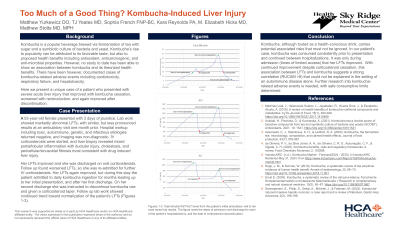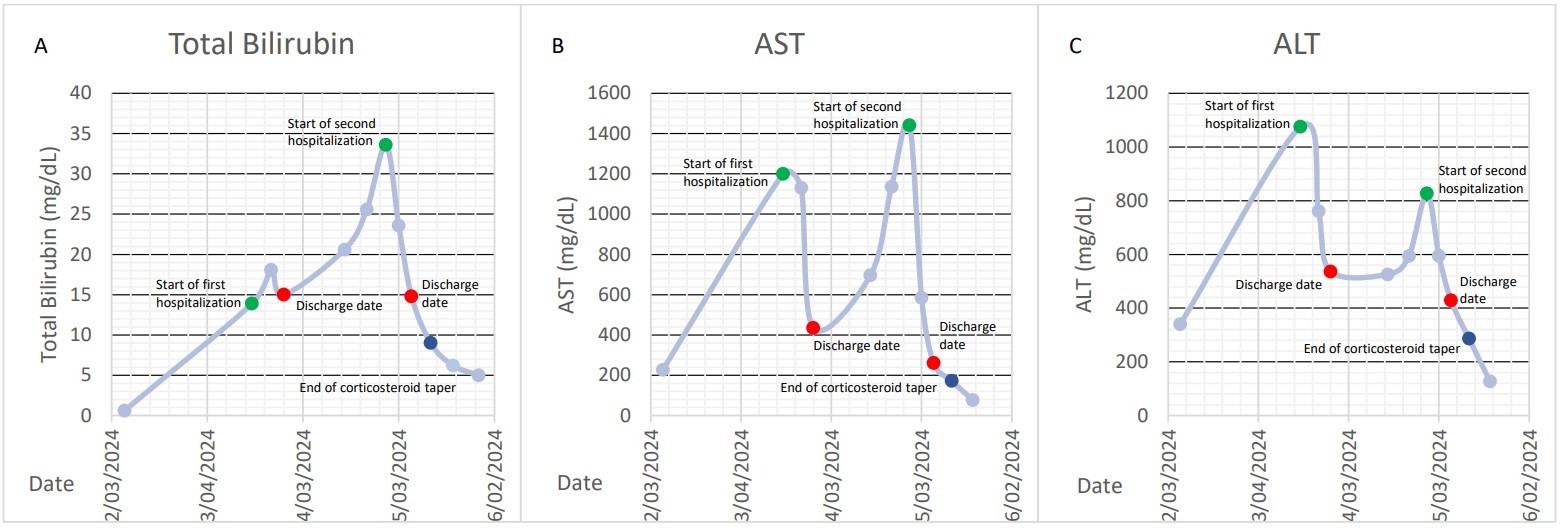Monday Poster Session
Category: Liver
P3138 - Too Much of a Good Thing? Kombucha-Induced Liver Injury
Monday, October 28, 2024
10:30 AM - 4:00 PM ET
Location: Exhibit Hall E

Has Audio
- MY
Matthew Yurkewicz, DO
Sky Ridge Medical Center
Englewood, CO
Presenting Author(s)
Award: Presidential Poster Award
Matthew Yurkewicz, DO1, Todd Yeates, MD2, Sophia French, FNP3, Kara Reynolds, PA-C4, Beth Hicks, MD2, Matthew Stotts, MD, MPH5
1Sky Ridge Medical Center, Englewood, CO; 2Sky Ridge Medical Center, Lone Tree, CO; 3Banner Health, Loveland, CO; 4Banner Health, Greeley, CO; 5Presbyterian St. Luke's Medical Center, Denver, CO
Introduction: Kombucha is a popular beverage brewed via fermentation of tea with sugar and a symbiotic culture of bacteria and yeast. Kombucha’s rise to popularity can be attributed to its favorable taste, but also to proposed health benefits including antioxidant, anticarcinogenic, and anti-microbial properties. However, no study to date has been able to show an association between kombucha and its theorized health benefits. There have been however, documented cases of kombucha-related adverse events including cardiotoxicity, respiratory failure, and hepatotoxicity.
Here we present a unique case of a patient who presented with severe acute liver injury that improved with kombucha cessation, worsened with reintroduction, and again improved after discontinuation.
Case Description/Methods: A 53-year-old female presented with 3 days of jaundice. Lab work showed markedly abnormal liver chemistries (LFTs), with similar, but less pronounced results at an ambulatory visit one month prior. Hospital workup including toxic, autoimmune, genetic, and viral/infectious etiologies returned negative, and imaging was non-diagnostic. Intravenous (IV) corticosteroids were started, and liver biopsy revealed mixed portal/lobular inflammation with ductular injury, cholestasis, and pericellular/sinusoidal fibrosis most consistent with drug induced liver injury. Her LFTs improved and she was discharged on oral corticosteroids. Hepatology follow up found worsened LFTs, so she was re-admitted for further IV corticosteroids. Her LFTs again improved, but during this stay the patient admitted to daily kombucha ingestion for months leading up to her initial presentation, and after her first discharge. On her second discharge she was instructed to discontinue kombucha use and given a corticosteroid taper. Follow up lab work continued to trend toward normalization of the patient’s LFTs (Figure 1:A-C).
Discussion: Kombucha, although touted as a health-conscious drink, carries potential associated risks that must not be ignored. In our patient's case, kombucha was consumed consistently prior to presentation and continued between hospitalizations. It was only during admission (times of limited access) that her LFTs improved. With continued improvement despite corticosteroid cessation, this association between LFTs and kombucha suggests a strong correlation (RUCAM >8) that could not be explained in the setting of an autoimmune disease. Further research into kombucha-related adverse events is needed, with safe consumptive limits determined.

Disclosures:
Matthew Yurkewicz, DO1, Todd Yeates, MD2, Sophia French, FNP3, Kara Reynolds, PA-C4, Beth Hicks, MD2, Matthew Stotts, MD, MPH5. P3138 - Too Much of a Good Thing? Kombucha-Induced Liver Injury, ACG 2024 Annual Scientific Meeting Abstracts. Philadelphia, PA: American College of Gastroenterology.
Matthew Yurkewicz, DO1, Todd Yeates, MD2, Sophia French, FNP3, Kara Reynolds, PA-C4, Beth Hicks, MD2, Matthew Stotts, MD, MPH5
1Sky Ridge Medical Center, Englewood, CO; 2Sky Ridge Medical Center, Lone Tree, CO; 3Banner Health, Loveland, CO; 4Banner Health, Greeley, CO; 5Presbyterian St. Luke's Medical Center, Denver, CO
Introduction: Kombucha is a popular beverage brewed via fermentation of tea with sugar and a symbiotic culture of bacteria and yeast. Kombucha’s rise to popularity can be attributed to its favorable taste, but also to proposed health benefits including antioxidant, anticarcinogenic, and anti-microbial properties. However, no study to date has been able to show an association between kombucha and its theorized health benefits. There have been however, documented cases of kombucha-related adverse events including cardiotoxicity, respiratory failure, and hepatotoxicity.
Here we present a unique case of a patient who presented with severe acute liver injury that improved with kombucha cessation, worsened with reintroduction, and again improved after discontinuation.
Case Description/Methods: A 53-year-old female presented with 3 days of jaundice. Lab work showed markedly abnormal liver chemistries (LFTs), with similar, but less pronounced results at an ambulatory visit one month prior. Hospital workup including toxic, autoimmune, genetic, and viral/infectious etiologies returned negative, and imaging was non-diagnostic. Intravenous (IV) corticosteroids were started, and liver biopsy revealed mixed portal/lobular inflammation with ductular injury, cholestasis, and pericellular/sinusoidal fibrosis most consistent with drug induced liver injury. Her LFTs improved and she was discharged on oral corticosteroids. Hepatology follow up found worsened LFTs, so she was re-admitted for further IV corticosteroids. Her LFTs again improved, but during this stay the patient admitted to daily kombucha ingestion for months leading up to her initial presentation, and after her first discharge. On her second discharge she was instructed to discontinue kombucha use and given a corticosteroid taper. Follow up lab work continued to trend toward normalization of the patient’s LFTs (Figure 1:A-C).
Discussion: Kombucha, although touted as a health-conscious drink, carries potential associated risks that must not be ignored. In our patient's case, kombucha was consumed consistently prior to presentation and continued between hospitalizations. It was only during admission (times of limited access) that her LFTs improved. With continued improvement despite corticosteroid cessation, this association between LFTs and kombucha suggests a strong correlation (RUCAM >8) that could not be explained in the setting of an autoimmune disease. Further research into kombucha-related adverse events is needed, with safe consumptive limits determined.

Figure: Figure 1: (A) Total bilirubin, (B) aspartate aminotransferase (AST), and (C) alanine transaminase (ALT) trends from the patient’s initial ambulatory visit to recent lab results. The graphs note the dates of admission and discharge for each of the patient’s hospitalizations, and the date of corticosteroid discontinuation.
Disclosures:
Matthew Yurkewicz indicated no relevant financial relationships.
Todd Yeates indicated no relevant financial relationships.
Sophia French indicated no relevant financial relationships.
Kara Reynolds indicated no relevant financial relationships.
Beth Hicks indicated no relevant financial relationships.
Matthew Stotts indicated no relevant financial relationships.
Matthew Yurkewicz, DO1, Todd Yeates, MD2, Sophia French, FNP3, Kara Reynolds, PA-C4, Beth Hicks, MD2, Matthew Stotts, MD, MPH5. P3138 - Too Much of a Good Thing? Kombucha-Induced Liver Injury, ACG 2024 Annual Scientific Meeting Abstracts. Philadelphia, PA: American College of Gastroenterology.

